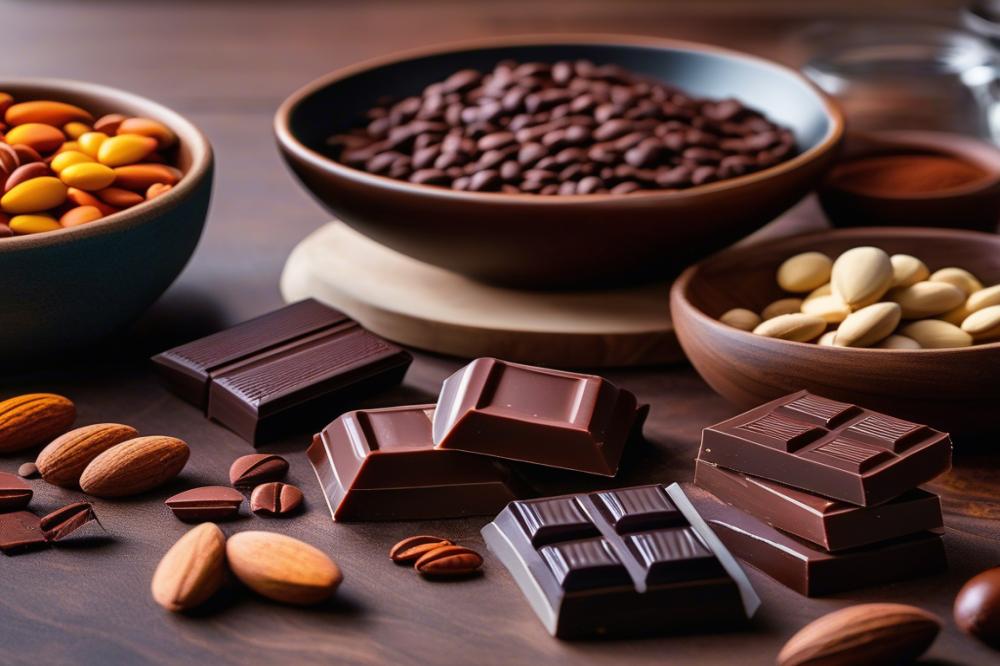The Rise of bean-to-bar chocolate Makers
In recent years, the chocolate industry has undergone significant changes. An increasing number of consumers are seeking artisan chocolate options that reflect high-quality sourcing and production methods. These shifts highlight a broader trend toward sustainability. More chocolate makers are focusing on ethical practices, ensuring that their cacao beans are sourced responsibly. The concept of small-batch chocolate has gained momentum, appealing to those who appreciate the nuances of flavor and craftsmanship.
What does bean-to-bar chocolate making mean? Simply put, it refers to a method where artisans control the entire chocolate making process, starting from the raw cacao beans to the final product. This approach not only highlights the skills involved in chocolate craftsmanship but also allows for greater transparency in sourcing. Consumers can now trace the journey of their favorite gourmet chocolate from farm to table.
The significance of this shift cannot be understated. As the demand for premium chocolate continues to grow, makers are responding with a commitment to artisanal techniques. craft chocolate offers a richer experience, with unique flavors that mass-produced alternatives often lack. By embracing this model, chocolate makers are meeting the desires of those who want more than just a sweet treat; they seek a connection to the methods and origins of their food.
Bean-to-Bar Chocolate: Understanding the Concept

The bean-to-bar chocolate process begins with the careful sourcing of cacao beans. Quality beans are essential for creating exceptional chocolate. Small-batch chocolate makers often visit farms to select their beans. This direct relationship promotes sustainable sourcing, ensuring that farmers receive fair compensation.
Once the beans are secured, the chocolate making process unfolds. Roasting transforms the raw beans, enhancing their rich flavors. After roasting, winnowing separates the shell from the nib, the edible part. Grinding follows, turning the nibs into a thick paste called chocolate liquor.
Many artisan chocolate makers still rely on traditional methods. Handcrafted techniques play a vital role in achieving the best quality and flavor. Various conching and tempering methods refine the chocolate’s texture. Each step in the chocolate production journey influences the final taste profile.
The attention to detail in chocolate craftsmanship cannot be overstated. Chocolatiers often experiment with different ingredients, resulting in numerous flavors and styles. Their dedication contributes to the growing appreciation for premium chocolate among consumers.
Gourmet chocolate has soared in popularity as people seek richer experiences. Ethical chocolate appeals to a more conscious audience looking to support sustainable practices. This trend has led to an explosion of new brands focused on quality and integrity. In this evolving landscape, small-batch chocolate makers are gaining respect and recognition.
The Role of Sustainable Sourcing

Sustainable sourcing plays a crucial role in the bean-to-bar movement. It focuses on using cacao beans grown in ways that benefit the environment and support farmers. Ethical chocolate practices are now a priority for many artisan chocolate makers. They recognize that the choices they make impact not only the quality of their products but also the communities growing their cacao.
Many small-batch chocolate producers actively seek out direct trade relationships with cacao farmers. This approach cuts out middlemen and allows farmers to receive fair compensation for their hard work. As a result, these chocolate makers foster better living conditions for the communities involved in chocolate production. They often visit farms to establish personal connections, understanding the challenges that farmers face.
The environmental benefits are significant as well. Sustainable practices in cacao farming can lead to healthier ecosystems. These may include reducing chemical use, improving soil quality, and promoting biodiversity. By focusing on sustainable sourcing, chocolate craftsmanship not only creates premium chocolate but also nurtures the land where cacao is grown.
Supporting ethical chocolate means prioritizing quality over quantity. When companies commit to sustainable sourcing, they often produce gourmet chocolate that stands out in flavor. This commitment can reshape local economies, allowing cacao farmers to invest in their communities and families. Consumers increasingly desire transparency in how their food is made, making this shift vital for the industry’s future.
In the end, the rise of bean-to-bar makers signifies more than just a new trend in chocolate making. It embodies a shift towards caring about the source of ingredients. Every bar crafted with integrity not only delights the taste buds but also tells a story of respect, community, and sustainability. The ripple effect from these practices can be felt across borders, benefitting everyone involved in the chocolate supply chain.
The Rise of Artisan and Small-Batch Chocolate Makers

In recent years, there has been a noticeable trend towards artisan chocolate production. More and more chocolate lovers are seeking small-batch chocolate makers. These craftspeople create unique treats that stand apart from mass-produced alternatives. From bean to bar, the entire chocolate making process is often intense and hands-on.
Many small-scale chocolatiers focus on sustainable sourcing of cacao beans. This commitment not only ensures better quality but also supports farming communities. By building direct relationships with farmers, these makers can trace their ingredients back to their sources. Such practices appeal to the growing consumer demand for ethical chocolate options.
Exceptional chocolate craftsmanship is evident in how small-batch producers operate. They often start with high-quality cacao beans and pay careful attention to each phase of production. Roasting, grinding, and conching are approached with precision, unlike in large factories. This meticulous approach often results in the discovery of rich flavors and complex textures.
Challenges abound in this business. Small-batch makers must navigate sourcing reliable ingredients while managing costs. Competition with big brands can be daunting, especially for those trying to carve out a niche. Yet, their focus on quality over quantity resonates with many food enthusiasts.
Consumers are increasingly turning to gourmet chocolate. This shift reflects a broader interest in artisanal foods and experiences. Tasting chocolate crafted in small batches creates a deeper appreciation. People want to know the story behind their treats. Each bar often comes with a narrative about the origins of the cacao and the makers themselves.
Marketing plays a crucial role in distinguishing artisan chocolate. Social media allows these small brands to reach audiences that value craftsmanship. More than just a sweet indulgence, it becomes an emotional experience. Packaging often highlights the unique qualities of the product, drawing attention to responsible practices and delicious flavors.
The rise of artisan and small-batch chocolate makers is reshaping the chocolate landscape. Traditional flavors compete with innovative profiles that change how we perceive chocolate. Artisan chocolate has carved out a significant spot in the hearts of many. As this trend continues, the impact on the industry is undeniable.
Innovations in the Chocolate Making Process
The world of artisan chocolate has seen remarkable changes in recent years. Bean-to-bar makers are at the forefront of these advancements. They experiment with novel methods and technologies that truly redefine the chocolate-making process.
Small-batch chocolate production allows for greater attention to detail. This approach not only enhances quality but also allows for creative flavor combinations. Producers now explore flavor profiles that once seemed impossible. For instance, the use of single-origin cacao beans highlights distinct characteristics of the cacao’s native region.
During the chocolate making process, these makers often utilize fermentation techniques to alter flavor development. Different fermentation times and conditions can lead to vibrant or subtle notes in the final product. Consumers can taste the dedication behind each bar of premium chocolate.
Ethical chocolate sourcing has grown in importance. Makers now prioritize relationships with farmers who practice sustainable methods. This commitment supports cocoa-producing communities and ensures better crops. The pursuit of high-quality cacao beans fuels both flavor and conscience.
Flavor experimentation is not limited to the chocolate itself. Some artisans have begun incorporating unexpected ingredients, such as spices or fruits, directly into their recipes. Each unique addition delivers a distinct taste profile, surprising even the most seasoned chocolate lovers.
Chocolate craftsmanship has taken on a new meaning. Instead of mass production, chocolate is treated as an art form. Makers share their stories, focusing on the history and origin of each ingredient. This level of transparency helps build trust and a deeper connection with consumers.
Many consumers seek gourmet chocolate that aligns with their values. There is a growing appreciation for brands that prioritize ethical practices. As a result, the demand for artisan creations continues to rise. People want to feel good about their indulgences, knowing they support a sustainable chocolate economy.
These innovations in chocolate production elevate the overall experience for consumers. Each bar becomes an exploration of taste and quality. The ability to enjoy chocolate that’s conscious and flavorful is a compelling reason for chocolate enthusiasts to embrace this new wave of makers.
Market Response and Consumer Trends
The rise of bean-to-bar chocolate makers has reshaped the market in several exciting ways. Consumers today are more aware of where their food comes from. This awareness has sparked a growing demand for ethical chocolate. Shoppers are eager to know about the sourcing of cacao beans and the entire chocolate making process.
Many buyers now prefer small-batch chocolate that highlights proper craftsmanship. Artisan chocolate brands emphasize quality over quantity. As a result, they maintain strong relationships with farmers, ensuring sustainable sourcing practices. Ethical considerations extend beyond just the cacao; they also include fair wages and working conditions for farmers.
Transparency is key in attracting modern consumers. Shoppers want to see detailed information about the origins of the cacao beans. Labels that tell a story resonate more with buyers. Companies that can show their commitment to responsible practices often gain customer loyalty.
Social media plays a vital role in this transformation. Pictures of gourmet chocolate or videos showcasing the chocolate production process often go viral. Influencers share their experiences with premium chocolate, reaching millions of potential customers. These platforms allow small-batch chocolate makers to connect directly with their audience, building a community around their brand.
Consumer preferences are driving innovation in the chocolate industry. More companies are experimenting with flavors and refining their skills. The increasing interest in plant-based diets sees specialty chocolates featuring alternative sweeteners or added superfoods. These unique products attract health-conscious individuals.
Additionally, the shift towards ethical consumption influences purchasing decisions. Many consumers are willing to pay a little more for chocolate that aligns with their values. The message is clear: people want better quality and deeper meaning in their treats. As these trends continue, the future of chocolate will likely see an emphasis on quality, ethics, and connection. This change is not merely a trend; it appears to be a significant shift in consumer behavior.
The Future of Artisan Chocolate Makers
The rise of bean-to-bar chocolate makers marks a significant shift in the chocolate industry. Many consumers now seek products that are not only delicious but also ethically produced. This growing awareness ties into broader trends in food production, where sustainability and transparency have become key concerns. As more chocolate lovers recognize the importance of sourcing and quality, small producers are stepping into the spotlight with artisan chocolate that tells a story from bean to bar.
Innovation is at the heart of this movement. New techniques and methods allow these makers to highlight the distinct flavors of cacao from various regions. This careful crafting produces chocolates that range from fruity to nutty, captivating the taste buds of even the most discerning palates. Pairing unique ingredients with high-quality cacao elevates the overall experience. Consumers are now more informed than ever about where their chocolate comes from and how it is made.
Supporting these small-scale producers can lead to a positive impact on farming communities. When consumers choose to buy from ethical chocolate practices, they are actively contributing to fair wages and sustainable farming methods. As demand grows, it’s crucial to encourage a market that prioritizes quality over quantity. This growing trend supports not just premium products but also the artisans who create them.
Exploring the world of artisanal options can be both exciting and rewarding. With a variety of flavors and styles, there is something for everyone. Taste adventures await those willing to step away from mass-produced options. The future of chocolate production looks bright, and consumers hold the power to shape it. By opting for artisanal choices, they support an industry that values transparency and ethics.
The rise of small chocolate makers is much more than a recent trend. It represents a meaningful change in how we perceive and consume this delightful treat. As you seek your next chocolate fix, consider exploring these unique offerings. Your choices can help drive a more sustainable future for chocolate and the people who dedicate their lives to making it.



